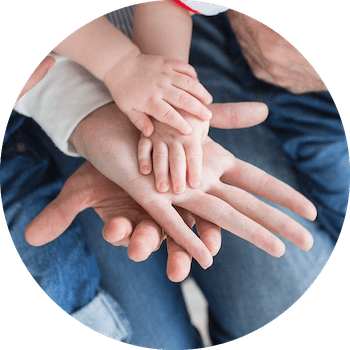Family Therapy
Does Your Family Unit Feel Out Of Sync?
Is your family struggling to communicate and get on the same page?
Are individual mental health issues impacting your family unit as a whole?
Do you wish there was a stronger sense of harmony in your life at home?
Maybe communication is breaking down between you and your family members and you’re struggling to maintain peace and harmony. Perhaps you, your spouse, and your children just aren’t feeling seen or heard by one another. And despite wanting to get on the same page, you may encounter frequent arguments, outbursts, or other barriers that keep you from having calm and honest conversations. For the first time, you might be thinking it’s time to see a family therapist.
Individual Mental Health Issues May be Impacting The Family As A Whole
It’s possible that the conflict you experience at home has been made worse by ongoing mental health struggles within the family unit. Maybe one or more of you struggle with mental health challenges—including anxiety, depression, PTSD, substance abuse, or an eating disorder. Instead of bringing you all closer together, these issues might cause you to drift farther apart.
These challenges are common among families with growing children. If you are feeling discouraged or confused about how to guide your family in overcoming your hurdles, know that you are not alone. Family therapy is a great opportunity to come together in a neutral space, receive meaningful guidance from an expert, and learn more effective strategies for communicating and getting each of your needs met.
All Families Experience Growing Pains
To put it simply, families are complicated. Every parent was once a child themselves, entering adulthood with their own unique emotional blueprint and experiences. Many people parent in response to the way they were raised, whether they mimic the same unhealthy behaviors they witnessed as children or do the polar opposite of what their parents did. It is often difficult to find a healthy, sustainable middle ground that does not perpetuate the cycle of generational trauma and distress.
Not to mention, families look very different than they did centuries ago. Whereas humans used to live in small, close-knit tribes sharing household responsibilities, our society is much more individualistic these days. Parents don’t have as much support in raising their children. And with the advent of the internet and other connective forces, children develop more nuanced perspectives on their individual identities, sometimes veering from their parents’ cultural, religious, and gender expectations. For many families, there is a sense of disconnection that would have been difficult to fathom even a few generations ago.
The truth is that no matter what our family looks like—whether blood-related or not—we all bring our own stories into our relationships. If we were hurt in the past in ways that never got healed or resolved, we are much more likely to carry that hurt into our present-day relationships. Healthy communication and connection require commitment and practice, but very few of us are naturally endowed with the skills it takes to get our needs met peacefully.
If your family experiences communication setbacks or other challenges impacting the group as a whole, counselling can be a meaningful opportunity to come together and work toward shared goals. Collaborating with a therapist who specializes in family systems, you can discover new, affirming ways to connect with each other.

Contact Us
Project Heal Offers Therapy That Is Individualized To The Unique Needs Of Each Family

Oftentimes, when families are stuck in a cycle of conflict, it’s because there is no neutral space where they can come together to calmly discuss differences. The home environment has become charged with negativity, making it difficult for each person to relate to each other in a healthy way. Therapy offers a safe atmosphere where family members can come together and explore their challenges in search of solutions and enhanced communication.
At Project Heal, we welcome families of all backgrounds to the counselling space. Whether you are navigating a significant transition, ongoing conflict, or individual mental health concerns that have impacted your family dynamic, our therapists will customize the counselling process to your unique needs.
What To Expect In Family Counselling Sessions
The therapeutic process will begin by considering each family member’s experience and their goals for therapy. While peeling back the layers of the issues impacting the family unit, our counsellors will aim to empower each individual to understand their role in the family’s overall dynamic. The more each part of the family heals, the more collective healing will be possible.
Some of the skills we incorporate into family therapy are meditation and breathing exercises to promote calmness, awareness skills to help you understand triggers, and emotional regulation strategies to decrease the potential for heated conflict. As each family member creates space for their emotions, they will learn to be accountable for their responses, slowly untangling the cycle of conflict that they’ve been stuck in.
Our Approach To Family Therapy
The modalities we use in family counselling are:
- Cognitive Behavioural Therapy (CBT)
- Dialectical Behaviour Therapy (DBT)
- Internal Family Systems (IFS)
- Narrative Therapy
- Attachment-Based Therapy
- Systemic Therapy
Our goal is to help your family feel calm and connected. From working with other families in therapy, we know that resolution and unity are possible. With practice and dedication, you can learn what it takes to navigate conflict and relate to one another with a sense of gratitude.
Still Unsure If Counselling Can Help Your Family?
If your family is used to resolving conflict through confrontation, it makes sense that you do not want to continue this dysfunction in the counselling space. However, family counsellors are specially trained to mitigate confrontation. We are here to offer essential skills for communicating effectively and calming your nervous system. You are likely to find that your family can discuss issues more effectively when you are guided by a nonjudgmental therapist in a neutral environment.
It’s probably hard enough for you to feel safe about opening up to your family in an honest way—let alone sharing your concerns with a therapist. However, as counsellors, we are specially trained to encourage honest conversations and vulnerability. We will hold space for all of you, bringing empathy and professionalism to the therapeutic process in a way that will help you feel comfortable throughout the process.
Our therapists understand that if you have exhausted your options for establishing peace and harmony among your family, you are likely feeling discouraged about counselling. But we have seen just how effective therapy can be in helping families of all backgrounds. All it takes is trust and commitment to the process—we assure you that your family is in the hands of trained, experienced professionals.
It's Time To Feel Connected To Each Other Again
Project Heal uses systemic and behavioral approaches in family therapy to help parents, children, and siblings foster a better sense of compassion and connection. For more information about how therapy can help your family, contact us.
Recent Posts
Why Is Family Communication So Important?
Communication is the main foundation for any type of relationship. It’s an exchange of information, feelings, opinions, ideas, and emotions between people.
How Effective Communication Impacts Your Relationships
Communication is a key factor for any type of relationship, whether with your co-workers, friends, family, and especially an intimate partner.
Can You Treat Depression without Medication?
Being hit with the blues from time to time is a normal part of life. Struggling with prolonged feelings of helplessness and hopelessness can indicate you’re experiencing depression.



